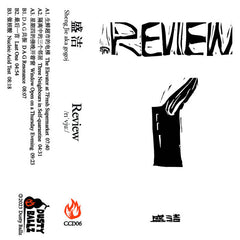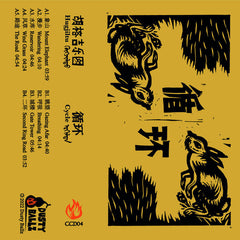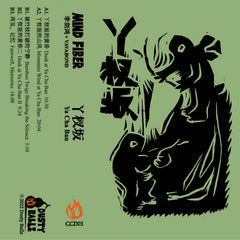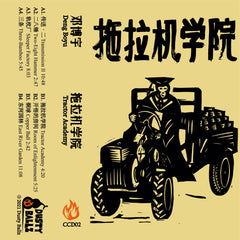Chunyang Yao 姚春旸 // Post-Oblivion 泯默集 TAPE
- Availability:
中国・麗江出身ナシ族の実験音楽家Chunyang Yaoが、2023年3月にイギリス・ロンドンの中国地下音楽専門レーベルDusty Ballzから50本限定でリリースした再発カセットです。
フリージャズ〜ドローン6曲を収録。DLコード付属。
以下、レーベルによる解説です。
2019年9月、麗江スタジオがキュレーションするレジデンス交換プログラムで、姚春旸は日本の先住民族であるアイヌが歴史的に居住していた北海道の町、白老に足を踏み入れた。その時、彼女は奇妙な逆転の感覚に襲われた。南西部の都市・麗江で生まれたナシ族のアーティストであるヤオは、中国ではある種のエキゾチックな視線にさらされながらパフォーマンスをすることに慣れていた。しかし、アイヌの難解な生活世界に足を踏み入れたとき、彼女は初めて自分が他民族の不思議な観客であり、その中に深い両義性をもって自分の民族の影を見ることになった。この絡み合いの瞬間は、ゆっくりと反響し、近代化の周縁で記憶する権利を求めてもがく2つの少数民族の伝統の間の繊細な共鳴に変換される。記憶が聞こえるものであるならば、忘れることは音を立てるのだろうか。この問いが、『Post-Oblivion』の制作の原動力となった。
『Post-Oblivion』は、そのタイトルから想像されるものとは異なり、聴く者に感情を要求する。カセットテープのA面には、ヤオが北海道に滞在して収集したフィールドレコーディングをもとにした5楽章のコンポジションが収録されており、B面には、声、ノイズサンプル、シンセサイザーによる長大な即興演奏が収録されている。作曲家として、またヴォーカルやエレクトロニクスの即興演奏家として、ヤオのユニークな芸術的センスが発揮された2つの面。また、現代アーティストとして、母親として、ナシ族の子孫として、そして異国の地を旅する者として、彼女のアイデンティティが重なり合い、複雑な音の風景が広がっている。
アイヌとナシ族は汎神論的な自然観を共有し、宗教と文化はその環境環境の中に組み込まれている。ナシ族のドンバ文字では、「音なし」と言うには、鉛の石、一対の角、欠けた月、クォークの4つのグリフが必要である。同様に、ヤオはアイヌのコミュニティと直接レコーディングするのではなく、北海道の自然の音風景から音楽の手がかりを集めた。海辺の町、苫小牧の上空で吹く風、猛烈な間欠泉、カモメの鳴き声、カラスが飛び回る音。それらを、「衣食住は土から生まれる」というナシ族のことわざを断片的に詠唱し、島をさまよう自分の存在と同じように織り込んでいく。ポスト・オブリビオンは、このように、喪失と同時に永続についても歌っている。自然のリズムと調和を通して、植民地時代の過去と文化的記憶の政治に立ち向かう、轟音のような沈黙を伝えている。
レーベルその他作品はこちら /// Click here to see more Dusty Ballz releases available at Tobira.
----------------------
Includes DL code. Edition of 50.
Dusty Ballz:
" There is nothing better than oblivion, since in oblivion there is no wish unfulfilled. (H. P. Lovecraft)
September 2019, during a residency exchange programme curated by the Lijiang Studio, Chunyang Yao set foot in Shiraoi, a town in Hokkaido historically populated by Japan’s indigenous people, the Ainu. A peculiar sense of inversion struck her. Being a Naxi artist emerging from the southwestern city of Lijiang, Yao had become accustomed to performing under a certain exotic gaze in China. Yet, dipping into the arcane, almost bygone lifeworld of the Ainu, for the first time she found herself to be the curious spectator upon another ethnic group, in whom she saw, with profound ambivalence, the shadow of her own people. This moment of entanglement reverberates on, slowly translating into a delicate resonance between two ethnic minority traditions, both struggling for the right to remembrance on the margins of modernity. If memory is audible, does forgetting make a sound? This question drove the making of Post-Oblivion.
Unlike what the title suggests, listening to Post-Oblivion demands emotion. Side A of the cassette contains a composition in five movements, which is based on field recordings collected during Yao’s stay in Hokkaido; Side B presents a long-form improvisation of voice, noise samples, and synthesisers, the track gets its title “AyuDabuya” from the babbling of Yao’s daughter after she heard the recording. Respectively, the two sides showcase Yao’s unique artistic sensibility as a composer and as a vocal/electronics improviser. Together they also present an intricate landscape of sound, cut across by her multiple, overlapping identities: as a contemporary artist, a mother, a Naxi descendent, and a traveller in a foreign land.
The Ainu and the Naxi share a pantheistic vision of nature, through which religion and culture are embedded in their environmental surroundings. In the Naxi Dongba script, to say “without a sound” takes four glyphs: a lead stone, a pair of horns, a waning moon, and quark. Likewise, instead of recording directly with the Ainu community, Yao gathered musical cues from Hokkaido’s natural soundscape — onshore breezes, a raging geyser, cries of the seagulls, and crows hovering above the seaside town of Tomakomai. She stitched them with a fragmented chant of the ancient Naxi proverb: “All food and clothing arise from the soil”, which weaves in and out just like her own wandering presence on the island. Post-Oblivion, as such, sings about loss but also perpetuity. Through nature’s own rhythm and harmony, it channels a roaring silence confronting colonial pasts and the politics of cultural memories."
Artist : Chunyang Yao 姚春旸
Label : Dusty Ballz
中国・麗江出身ナシ族の実験音楽家Chunyang Yaoが、2023年3月にイギリス・ロンドンの中国地下音楽専門レーベルDusty Ballzから50本限定でリリースした再発カセットです。
フリージャズ〜ドローン6曲を収録。DLコード付属。
以下、レーベルによる解説です。
2019年9月、麗江スタジオがキュレーションするレジデンス交換プログラムで、姚春旸は日本の先住民族であるアイヌが歴史的に居住していた北海道の町、白老に足を踏み入れた。その時、彼女は奇妙な逆転の感覚に襲われた。南西部の都市・麗江で生まれたナシ族のアーティストであるヤオは、中国ではある種のエキゾチックな視線にさらされながらパフォーマンスをすることに慣れていた。しかし、アイヌの難解な生活世界に足を踏み入れたとき、彼女は初めて自分が他民族の不思議な観客であり、その中に深い両義性をもって自分の民族の影を見ることになった。この絡み合いの瞬間は、ゆっくりと反響し、近代化の周縁で記憶する権利を求めてもがく2つの少数民族の伝統の間の繊細な共鳴に変換される。記憶が聞こえるものであるならば、忘れることは音を立てるのだろうか。この問いが、『Post-Oblivion』の制作の原動力となった。
『Post-Oblivion』は、そのタイトルから想像されるものとは異なり、聴く者に感情を要求する。カセットテープのA面には、ヤオが北海道に滞在して収集したフィールドレコーディングをもとにした5楽章のコンポジションが収録されており、B面には、声、ノイズサンプル、シンセサイザーによる長大な即興演奏が収録されている。作曲家として、またヴォーカルやエレクトロニクスの即興演奏家として、ヤオのユニークな芸術的センスが発揮された2つの面。また、現代アーティストとして、母親として、ナシ族の子孫として、そして異国の地を旅する者として、彼女のアイデンティティが重なり合い、複雑な音の風景が広がっている。
アイヌとナシ族は汎神論的な自然観を共有し、宗教と文化はその環境環境の中に組み込まれている。ナシ族のドンバ文字では、「音なし」と言うには、鉛の石、一対の角、欠けた月、クォークの4つのグリフが必要である。同様に、ヤオはアイヌのコミュニティと直接レコーディングするのではなく、北海道の自然の音風景から音楽の手がかりを集めた。海辺の町、苫小牧の上空で吹く風、猛烈な間欠泉、カモメの鳴き声、カラスが飛び回る音。それらを、「衣食住は土から生まれる」というナシ族のことわざを断片的に詠唱し、島をさまよう自分の存在と同じように織り込んでいく。ポスト・オブリビオンは、このように、喪失と同時に永続についても歌っている。自然のリズムと調和を通して、植民地時代の過去と文化的記憶の政治に立ち向かう、轟音のような沈黙を伝えている。
レーベルその他作品はこちら /// Click here to see more Dusty Ballz releases available at Tobira.
----------------------
Includes DL code. Edition of 50.
Dusty Ballz:
" There is nothing better than oblivion, since in oblivion there is no wish unfulfilled. (H. P. Lovecraft)
September 2019, during a residency exchange programme curated by the Lijiang Studio, Chunyang Yao set foot in Shiraoi, a town in Hokkaido historically populated by Japan’s indigenous people, the Ainu. A peculiar sense of inversion struck her. Being a Naxi artist emerging from the southwestern city of Lijiang, Yao had become accustomed to performing under a certain exotic gaze in China. Yet, dipping into the arcane, almost bygone lifeworld of the Ainu, for the first time she found herself to be the curious spectator upon another ethnic group, in whom she saw, with profound ambivalence, the shadow of her own people. This moment of entanglement reverberates on, slowly translating into a delicate resonance between two ethnic minority traditions, both struggling for the right to remembrance on the margins of modernity. If memory is audible, does forgetting make a sound? This question drove the making of Post-Oblivion.
Unlike what the title suggests, listening to Post-Oblivion demands emotion. Side A of the cassette contains a composition in five movements, which is based on field recordings collected during Yao’s stay in Hokkaido; Side B presents a long-form improvisation of voice, noise samples, and synthesisers, the track gets its title “AyuDabuya” from the babbling of Yao’s daughter after she heard the recording. Respectively, the two sides showcase Yao’s unique artistic sensibility as a composer and as a vocal/electronics improviser. Together they also present an intricate landscape of sound, cut across by her multiple, overlapping identities: as a contemporary artist, a mother, a Naxi descendent, and a traveller in a foreign land.
The Ainu and the Naxi share a pantheistic vision of nature, through which religion and culture are embedded in their environmental surroundings. In the Naxi Dongba script, to say “without a sound” takes four glyphs: a lead stone, a pair of horns, a waning moon, and quark. Likewise, instead of recording directly with the Ainu community, Yao gathered musical cues from Hokkaido’s natural soundscape — onshore breezes, a raging geyser, cries of the seagulls, and crows hovering above the seaside town of Tomakomai. She stitched them with a fragmented chant of the ancient Naxi proverb: “All food and clothing arise from the soil”, which weaves in and out just like her own wandering presence on the island. Post-Oblivion, as such, sings about loss but also perpetuity. Through nature’s own rhythm and harmony, it channels a roaring silence confronting colonial pasts and the politics of cultural memories."
Artist : Chunyang Yao 姚春旸
Label : Dusty Ballz







